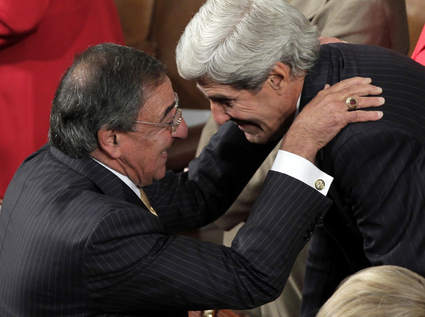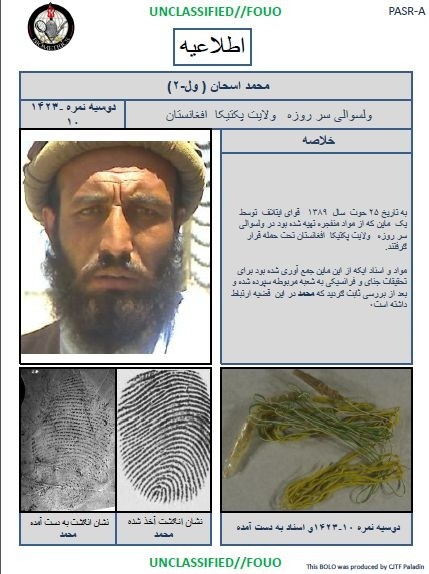Pakistan: US Participation a Must in Russia-initiated Afghan Talks
As Reported by Ayaz Gul for The Voice of America
ISLAMABAD, PAKISTAN —
Pakistan says that Russia-sponsored international talks on Afghanistan must involve the United States for bringing peace to the war-riven country, because Washington is the “biggest stakeholder” there.
Moscow plans to host this week (April 14) a new expanded round of multi-nation “consultations” it has recently launched with the stated goals of developing a “regional approach” for promoting Afghan security and a government-led national reconciliation with the Taliban.
But the U.S. administration has already refused to take part in the conference, questioning Russian intentions and motives.
Speaking to a local television station before the Moscow talks, the Pakistani prime minister’s foreign policy aide, Tariq Fatemi, stopped short of admitting the absence of Washington will not allow the multi-nation process to achieve its mission.
“They [U.S] have their troops present [in Afghanistan], they have invested one trillion dollars there, they are the biggest stakeholder, they have lost hundreds of their soldiers, so they have their interests there,” Fatemi explained.
While Afghanistan, Pakistan, Iran, China, India were represented in the last round of talks in Moscow earlier this year, former Soviet Central Asian states have been invited for the first time to attend the April 14 conference.
“We hope and desire that when any such peace initiative will enter into a next stage, America will have to be made part of it,” Fatemi told Aaj TV when asked whether the Russian-initiated process could bring peace to Afghanistan without Washington.
Pakistan believes Russia is “positively” using its influence with the Taliban to encourage them to join peace talks and Islamabad is supportive of any such efforts, Fatemi insisted.
“Russia has told us its major concerns are that if civil war conditions are there in Afghanistan, it can become a center for terrorist organizations like Islamic State, or Daesh, who will then try to infiltrate into bordering Central Asian states,” the Pakistani official explained.
The Taliban’s attacks on rival IS fighters in a bid to prevent them from establishing a foothold in the country apparently encouraged Russia to support the insurgent group. But Afghan President Ashraf Ghani on Sunday again warned Moscow against maintaining contacts with the Taliban.
“Anyone who thinks they can help themselves by helping the enemy of their enemy is mistaken. Anyone who thinks that they can differentiate between good and bad terrorism is mistaken,” Ghani said.
Speaking at a news conference in Kabul, Ghani acknowledged Russia is also threatened by terrorism and sympathized with victims of recent terrorist attack in that country.
“We have an intense dialogue with all our interlocutors because a stable Afghanistan is to everybody’s benefit and unstable Afghanistan hurts everyone,” Ghani said when asked whether Kabul plans to attend Moscow talks on Friday. He added he wants Afghanistan “as a center of cooperation” in all efforts aimed at stabilizing his country.
The Russian foreign ministry, while regretting Washington’s refusal to attend the coming talks, had also underscored the United States is an “important player” in settling the Afghan conflict.
“So [the United States] joining the peacekeeping efforts of the countries of the region would help to reinforce the message to the Afghan armed opposition regarding the need to stop armed resistance and to start talks,” it maintained.
Meanwhile, Fatemi said Pakistan has also stepped up diplomatic efforts to ease tensions with Afghanistan and is seeking implementation of a proposed mechanism the two sides agreed to in talks last months that were mediated by Britain.
The mechanism, he explained, would allow establishment of a “channel of communication at different levels” between Islamabad and Kabul to help remove “any misunderstanding” and deal with any terrorist incident on either side of their shared border.
“Talks [between the two countries] at the Army level and at different other levels are currently underway, and at a final stage, if needed, foreign ministers of the two countries will also engage in frequent meetings,” Fatemi said.
Afghanistan and Pakistan each deny allegations they harbor and support anti-state militants engaged in terrorist attacks on their respective soils. Tensions have lately risen because of Islamabad’s unilateral border security measures to prevent terrorist infiltration.
Kabul disputes portions of the 2,600-kilometer border between the two countries and is opposed to fencing them, saying it will further add to problems facing divided families.


















Pakistan: Between a Rock and A Hard Place
By Yekaterina Kudashkina for The Voice of Russia
Interview with Dr. Theodore Karasik – the Director of Research and Development at the Institute for Near East and Gulf Military Analysis (INEGMA) in Dubai.
Particularly you have to first understand that the situation in Pakistan is rather icy politically, as well as on the religious scale. Pakistan now finds itself between a rock and a hard place when it comes to how it fits into the US and Western plans to halt fighting in Afghanistan as well as to get rid of terrorist events in the northwest frontier province. So, the Pakistani press is going to be very inflamed though, not only because of the NATO Summit, but also because of the sentencing of the doctor who outed Bin Laden for a sentence of 33 years.
Apparently what happened was that the US had managed to find a Pakistani physician who was able to pinpoint the location of Bin Laden’s compound and as a result of the leakage of this information in the US and foreign press this doctor was arrested and tried very quickly in Pakistan and sentenced to 33 years in jail for giving up Bin Laden’s position. This is a political trial where Pakistanis want to make an example of this individual by arguing that he managed to fail the state by giving up the secret of where Bin Laden was hiding.
Do you think that this case is going to further deteriorate the relations between the US and Pakistan or is it just a root in development?
I think it is a bit of both. I think that will embarrass the US-Pakistani relations. I think that will be pressuring the United States of why did the US revealed the identity of this doctor. There is also a discussion about how this relationship with Pakistan and the United States will continue in terms of transport of nonlethal goods to Afghanistan.
Now, talking about that issue. Do I get it right that the negotiations are still under way in Islamabad regarding the transportation routes agreement, the new one?
Yes, the negotiations are still ongoing in Islamabad about transferring nonlethal goods into the Afghan theatre. And Pakistanis are using this episode to put political pressure on US to make concessions, particularly when it comes to military aid or paying of very high prices for use of this supply lines.
Are we talking about concessions in terms of money or in some other aspects?
It’s a combination of both money and political support for the Zardari Government.
Is the US prepared to offer a political support for Zardari Government in the present circumstances?
At this time I would say that the United States is going to play quite tough with Pakistan. Let’s face it – Pakistan is just barely above a failed state. And the US needs to make sure that Pakistan does not descend in the total chaos while at the same time applying pressure on Pakistan to guarantee that the state remains somewhat coherent together.
The signals of the resumption of negotiations in Islamabad were generally seen as a sign that perhaps they could be ameliorating. And then came Zardari’s visit to Chicago. By the way, why would the Pakistanis be so disappointed with the results of his visit? What were their expectations?
I think that they were expecting to be treated more as an equal and key to solving the Afghan problem as well as to part of trying to help with the withdrawal of troops from Afghanistan. But instead you had this political issues popup and then you had Zardari acting in a very strange way by missing the key events like the group of progress of all the leaders and so on. I think that they left Chicago messed.
Does the United States want to ameliorate them and what needs to be done if there is a certain desire to make them better?
Clearly a lot of problems need to be discussed and we need to find the right remedies that would help both countries work together in this difficult time. I think it is going to get more difficult as tensions build over what to do with Afghanistan and the withdrawal from Afghanistan of NATO forces. Pakistan has an important role to play in all this because of the supply routes as we talked about previously. So, I think we are going to be entering a period of more jostling for position, negotiation that could get quite ugly at some points.
Share this:
Pakistan
Pakistan Army
Pakistanis
United States
US Army
US-Pakistan Relations
Afghanistan
Bin Laden
Commentary
Dr. Theodore Karasik
INEGMA
Institute for Near East and Gulf Military Analys
Interview
Islamabad
NATO
Obama Administration
OBL
Pakistan
Politics
U.S.- Pakistani relations
United States
US-Pakistani relations
Voice of Russia
World
Yekaterina Kudashkina